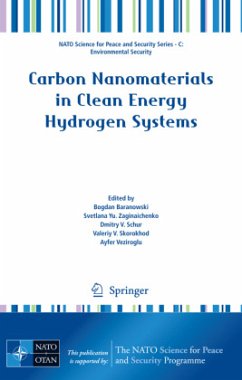The energy arteries of the corporate body of mankind are still fed mainly by fossil fuels; but they are in danger of running dry soon unless new energy sources are made available.
One of the most important as well as the most ecologically pure power source is hydrogen, that constitutes the heart of hydrogen power engineering and considered as a future alternative to fossil power sources.
The chemistry of carbon nanomaterials and hydrogen materials science will play an important role in hastening the conversion to the Hydrogen Energy System.
In this connection the research and application of materials capable of interacting actively with hydrogen, its accumulating and storing will be of the utmost significance. This is of particular actuality for creation of mobile energy sources both for mobile telephones and for hybrid electric cars that are developed by all large car manufacturers of the world. In this connection the hydrogen capacity of carbon nanostructural materials, such as fullerenes, nanotubes, nanofibers and other nanostructures, has aroused a special interest of researchers.
Hydriding metals, alloys, nanocarbon and composite materials can store hydrogen safely at relatively low pressures and temperatures. Very many other applications are also possible - such as heating and cooling, waste heat storage, pumping, pressurizing, heat-pumping, hydrogen purifying, deuterium separation, electricity production, etc.
As a source of 'clean' energy, hydrogen is also going to be the permanent answer to another global problem caused by utilization of fossil fuels, such as the greenhouse effect, climate change, acid rains, ozone layer depletion, pollution and oil spills.
The 2007 ARW "Using Carbon Nanomaterials in Clean-Energy Hydrogen Systems" (UCNCEHS'2007) was held in September 22-28, 2007 in the remarkable town Sudak (Crimea, Ukraine) known for its heroic and unusual fate. In the tradition of the earlier conferences, UCNCEHS'2007 meeting served as an multidisciplinary forum for the presentation and discussion of the most recent research on transition to hydrogen-based energy systems, technologies for hydrogen production, storage, utilization, carbon nanomaterials processing and chemical behavior, energy and environmental problems. The aim of UCNCEHS'2007 was to provide the wide overview of the latest scientific results on basic research and technological applications of hydrogen interactions with carbon materials. The active representatives from research/academic organizations and governmental agencies could meet, discuss and present the most recent advances in hydrogen concepts, processes and systems, to evaluate current progress and to exchange academic information, to identify research needs and future development in this important area. This ARW should help further the progress of hydrogen-based science and promote the role of hydrogen and carbon nanomaterials in the energy field.
One of the most important as well as the most ecologically pure power source is hydrogen, that constitutes the heart of hydrogen power engineering and considered as a future alternative to fossil power sources.
The chemistry of carbon nanomaterials and hydrogen materials science will play an important role in hastening the conversion to the Hydrogen Energy System.
In this connection the research and application of materials capable of interacting actively with hydrogen, its accumulating and storing will be of the utmost significance. This is of particular actuality for creation of mobile energy sources both for mobile telephones and for hybrid electric cars that are developed by all large car manufacturers of the world. In this connection the hydrogen capacity of carbon nanostructural materials, such as fullerenes, nanotubes, nanofibers and other nanostructures, has aroused a special interest of researchers.
Hydriding metals, alloys, nanocarbon and composite materials can store hydrogen safely at relatively low pressures and temperatures. Very many other applications are also possible - such as heating and cooling, waste heat storage, pumping, pressurizing, heat-pumping, hydrogen purifying, deuterium separation, electricity production, etc.
As a source of 'clean' energy, hydrogen is also going to be the permanent answer to another global problem caused by utilization of fossil fuels, such as the greenhouse effect, climate change, acid rains, ozone layer depletion, pollution and oil spills.
The 2007 ARW "Using Carbon Nanomaterials in Clean-Energy Hydrogen Systems" (UCNCEHS'2007) was held in September 22-28, 2007 in the remarkable town Sudak (Crimea, Ukraine) known for its heroic and unusual fate. In the tradition of the earlier conferences, UCNCEHS'2007 meeting served as an multidisciplinary forum for the presentation and discussion of the most recent research on transition to hydrogen-based energy systems, technologies for hydrogen production, storage, utilization, carbon nanomaterials processing and chemical behavior, energy and environmental problems. The aim of UCNCEHS'2007 was to provide the wide overview of the latest scientific results on basic research and technological applications of hydrogen interactions with carbon materials. The active representatives from research/academic organizations and governmental agencies could meet, discuss and present the most recent advances in hydrogen concepts, processes and systems, to evaluate current progress and to exchange academic information, to identify research needs and future development in this important area. This ARW should help further the progress of hydrogen-based science and promote the role of hydrogen and carbon nanomaterials in the energy field.
From the reviews:
"This volume ... serve as both a useful reference and resource material for all the participants and for those whose UCNCEHS'2007 ARW has been a unique event in bringing together hydrogen and carbon materials researchers, scientists, engineers and practitioners from developed countries of Europe and America, new independent states of FSU and other countries for discussions in advanced materials development and applications. ... The volume is wonderful. Carbon Nanomaterials in Clean Energy Hydrogen Systems is a must. ... A softcover edition is also available." (Current Engineering Practice, 2009)
"This volume ... serve as both a useful reference and resource material for all the participants and for those whose UCNCEHS'2007 ARW has been a unique event in bringing together hydrogen and carbon materials researchers, scientists, engineers and practitioners from developed countries of Europe and America, new independent states of FSU and other countries for discussions in advanced materials development and applications. ... The volume is wonderful. Carbon Nanomaterials in Clean Energy Hydrogen Systems is a must. ... A softcover edition is also available." (Current Engineering Practice, 2009)

